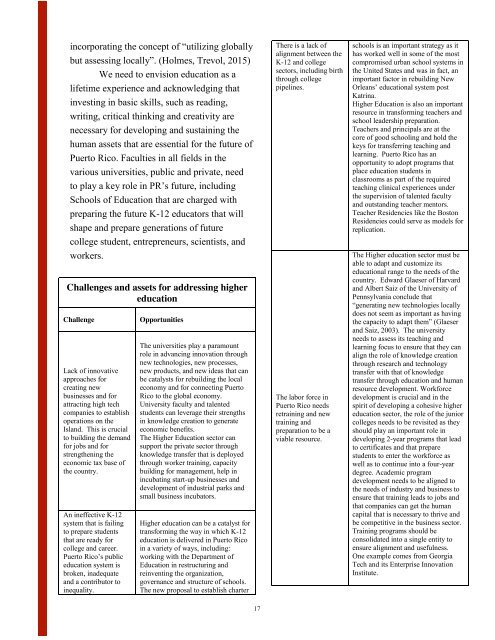CLC-Conference-Proceeding-2018
You also want an ePaper? Increase the reach of your titles
YUMPU automatically turns print PDFs into web optimized ePapers that Google loves.
incorporating the concept of “utilizing globally<br />
but assessing locally”. (Holmes, Trevol, 2015)<br />
We need to envision education as a<br />
lifetime experience and acknowledging that<br />
investing in basic skills, such as reading,<br />
writing, critical thinking and creativity are<br />
necessary for developing and sustaining the<br />
human assets that are essential for the future of<br />
Puerto Rico. Faculties in all fields in the<br />
various universities, public and private, need<br />
to play a key role in PR’s future, including<br />
Schools of Education that are charged with<br />
preparing the future K-12 educators that will<br />
shape and prepare generations of future<br />
college student, entrepreneurs, scientists, and<br />
workers.<br />
Challenges and assets for addressing higher<br />
education<br />
Challenge<br />
Lack of innovative<br />
approaches for<br />
creating new<br />
businesses and for<br />
attracting high tech<br />
companies to establish<br />
operations on the<br />
Island. This is crucial<br />
to building the demand<br />
for jobs and for<br />
strengthening the<br />
economic tax base of<br />
the country.<br />
An ineffective K-12<br />
system that is failing<br />
to prepare students<br />
that are ready for<br />
college and career.<br />
Puerto Rico’s public<br />
education system is<br />
broken, inadequate<br />
and a contributor to<br />
inequality.<br />
Opportunities<br />
The universities play a paramount<br />
role in advancing innovation through<br />
new technologies, new processes,<br />
new products, and new ideas that can<br />
be catalysts for rebuilding the local<br />
economy and for connecting Puerto<br />
Rico to the global economy.<br />
University faculty and talented<br />
students can leverage their strengths<br />
in knowledge creation to generate<br />
economic benefits.<br />
The Higher Education sector can<br />
support the private sector through<br />
knowledge transfer that is deployed<br />
through worker training, capacity<br />
building for management, help in<br />
incubating start-up businesses and<br />
development of industrial parks and<br />
small business incubators.<br />
Higher education can be a catalyst for<br />
transforming the way in which K-12<br />
education is delivered in Puerto Rico<br />
in a variety of ways, including:<br />
working with the Department of<br />
Education in restructuring and<br />
reinventing the organization,<br />
governance and structure of schools.<br />
The new proposal to establish charter<br />
There is a lack of<br />
alignment between the<br />
K-12 and college<br />
sectors, including birth<br />
through college<br />
pipelines.<br />
The labor force in<br />
Puerto Rico needs<br />
retraining and new<br />
training and<br />
preparation to be a<br />
viable resource.<br />
schools is an important strategy as it<br />
has worked well in some of the most<br />
compromised urban school systems in<br />
the United States and was in fact, an<br />
important factor in rebuilding New<br />
Orleans’ educational system post<br />
Katrina.<br />
Higher Education is also an important<br />
resource in transforming teachers and<br />
school leadership preparation.<br />
Teachers and principals are at the<br />
core of good schooling and hold the<br />
keys for transferring teaching and<br />
learning. Puerto Rico has an<br />
opportunity to adopt programs that<br />
place education students in<br />
classrooms as part of the required<br />
teaching clinical experiences under<br />
the supervision of talented faculty<br />
and outstanding teacher mentors.<br />
Teacher Residencies like the Boston<br />
Residencies could serve as models for<br />
replication.<br />
The Higher education sector must be<br />
able to adapt and customize its<br />
educational range to the needs of the<br />
country. Edward Glaeser of Harvard<br />
and Albert Saiz of the University of<br />
Pennsylvania conclude that<br />
“generating new technologies locally<br />
does not seem as important as having<br />
the capacity to adapt them” (Glaeser<br />
and Saiz, 2003). The university<br />
needs to assess its teaching and<br />
learning focus to ensure that they can<br />
align the role of knowledge creation<br />
through research and technology<br />
transfer with that of knowledge<br />
transfer through education and human<br />
resource development. Workforce<br />
development is crucial and in the<br />
spirit of developing a cohesive higher<br />
education sector, the role of the junior<br />
colleges needs to be revisited as they<br />
should play an important role in<br />
developing 2-year programs that lead<br />
to certificates and that prepare<br />
students to enter the workforce as<br />
well as to continue into a four-year<br />
degree. Academic program<br />
development needs to be aligned to<br />
the needs of industry and business to<br />
ensure that training leads to jobs and<br />
that companies can get the human<br />
capital that is necessary to thrive and<br />
be competitive in the business sector.<br />
Training programs should be<br />
consolidated into a single entity to<br />
ensure alignment and usefulness.<br />
One example comes from Georgia<br />
Tech and its Enterprise Innovation<br />
Institute.



